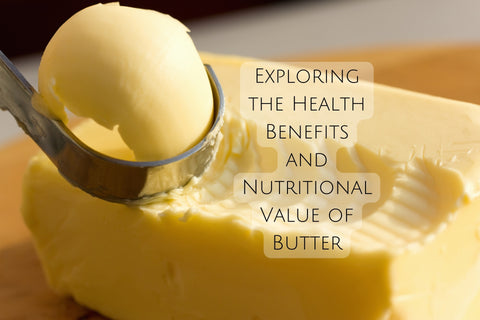Introduction:
Welcome to the world of butter, a beloved culinary staple cherished for its rich flavor, creamy texture, and versatile uses in cooking and baking. While butter has been a dietary staple for centuries, its reputation has been the subject of much debate in recent years. In this blog, we'll dive deep into the nutritional profile of butter, explore its health benefits, and debunk common myths surrounding its consumption.
The Rich Tradition of Butter:

Butter, a seemingly simple spread, boasts a surprisingly rich and fascinating history. From its ancient origins to its cultural significance across the globe, butter has played a vital role in human societies for millennia. Let's delve into the creamy depths of butter's past, exploring its journey from humble beginnings to a cherished ingredient.
Ancient Whisks and Churns: The Early Days of Butter
The exact origins of butter remain shrouded in time, but archaeological evidence suggests butter production dates back to at least 3000 BC. Here are some glimpses into butter's early history:
- Nomadic Discoveries: Some theories suggest nomadic tribes churning butter from sheep or goat milk while traveling, noticing the fatty solids separating from the liquid whey.
- Bog Offerings: Remarkably preserved "bog butter" has been discovered in peat bogs across Europe, dating back thousands of years. The purpose of these offerings remains a mystery, but they hint at the value placed on butter in ancient cultures.
Nutritional Composition:

The nutritional composition of butter and uncover its wealth of essential nutrients. While often maligned for its high saturated fat content, butter is also a rich source of fat-soluble vitamins like vitamin A, vitamin E, and vitamin K2, as well as beneficial fatty acids like conjugated linoleic acid (CLA) and butyrate.
Heart Health and Saturated Fat:

Navigating Butter and Heart Health:Butter can be enjoyed as part of a balanced diet that prioritizes heart health. Here are some tips:
- Moderation is Key: Limit butter intake and use it sparingly. A pat here and there is okay, but avoid excessive use.
- Focus on Quality: Consider grass-fed butter, which may contain slightly less saturated fat and more beneficial CLA (conjugated linoleic acid).
- Healthy Fat Swaps: Explore alternatives like olive oil or avocado oil for some cooking applications.
- Embrace a Balanced Diet: Prioritize fruits, vegetables, whole grains, and lean protein sources to create a heart-healthy foundation for your meals.
Brain Health and Cognitive Function:

- Saturated Fat and Cognitive Decline: Research suggests a possible connection between high saturated fat intake and an increased risk of cognitive decline and dementia.
- Focus on the Bigger Picture: While some studies suggest a link between saturated fat and cognitive decline, the picture is complex. Other dietary factors, lifestyle habits, and overall health significantly influence brain health.
Gut Health and Butyrate:

The Gut Microbiome: A Balancing Act
Our gut microbiome is a complex ecosystem of trillions of bacteria that play a crucial role in digestion, immune function, and overall health. A diverse and balanced gut microbiome plays a crucial role in supporting overall health and well-being, contributing to various aspects of our physiological and metabolic functions.
Butyrate: A Power Player in Gut Health
Butyrate is a short-chain fatty acid produced by the beneficial bacteria in our gut through the fermentation of dietary fiber. However, small amounts are also naturally present in some foods, including butter.
Butyrate, a short-chain fatty acid produced by gut bacteria from dietary fiber and certain fats, has been linked to reduced inflammation, improved gut barrier function, and enhanced digestive health.
Bone Health and Vitamin K2:

Building Strong Bones: The Importance of Vitamin K2
Vitamin K2 plays a vital role in bone health by activating proteins that help deposit calcium in our bones, making them stronger and denser. Here's how vitamin K2 contributes to healthy bones:
- Calcium Regulation: Vitamin K2 helps activate osteocalcin, a protein that binds calcium to the bone matrix, promoting bone mineralization and strength.
- Reduces Bone Loss: Adequate vitamin K2 intake may help reduce bone breakdown and the risk of fractures, especially in older adults.
While the vitamin K2 in butter might offer some potential benefits, bone health relies on a combination of factors:
- Calcium Intake: Adequate calcium intake is crucial for building and maintaining strong bones. Incorporating these calcium-rich foods into your diet can help support bone health and overall well-being.
- Vitamin D: Vitamin D aids calcium absorption. Sunlight exposure and dietary sources like fatty fish and fortified foods are essential.
- Weight-bearing Exercise: Regular weight-bearing exercises like walking, running, or dancing help stimulate bone growth and prevent bone loss.
Incorporating Butter into a Balanced Diet: Tips and Recipes

Butter's rich flavor and versatility can elevate countless dishes. However, enjoying it as part of a balanced diet is key. Here are some tips and delicious recipes to help you savor the taste of butter while keeping your health in mind:
Tips for Mindful Butter Consumption:
- Moderation is Key: Limit butter intake and use it sparingly. A pat here and there is okay, but avoid excessive use.
- Focus on Quality: Consider grass-fed butter, which may contain slightly less saturated fat and more beneficial CLA (conjugated linoleic acid).
- Healthy Fat Swaps: Explore alternatives like olive oil or avocado oil for some cooking applications, especially high-heat cooking.
- Portion Control: Be mindful of serving sizes.
- Embrace a Balanced Diet: Make fruits, vegetables, whole grains, and lean protein sources the foundation of your meals.
Conclusion:
In conclusion, butter is more than just a delicious indulgence—it's a nutrient-rich powerhouse with a myriad of health benefits. When enjoyed in moderation as part of a balanced diet, butter can be a flavorful and nutritious addition to your culinary repertoire. So, embrace the golden goodness of butter and savor its richness, knowing that you're nourishing your body and delighting your taste buds in the process.




Comments (0)
There are no comments for this article. Be the first one to leave a message!